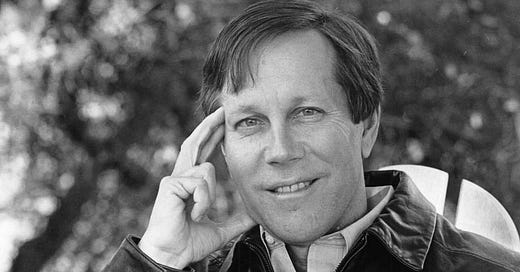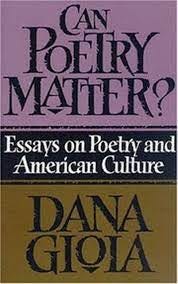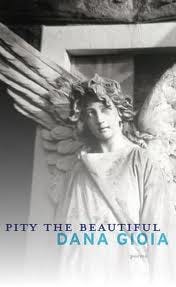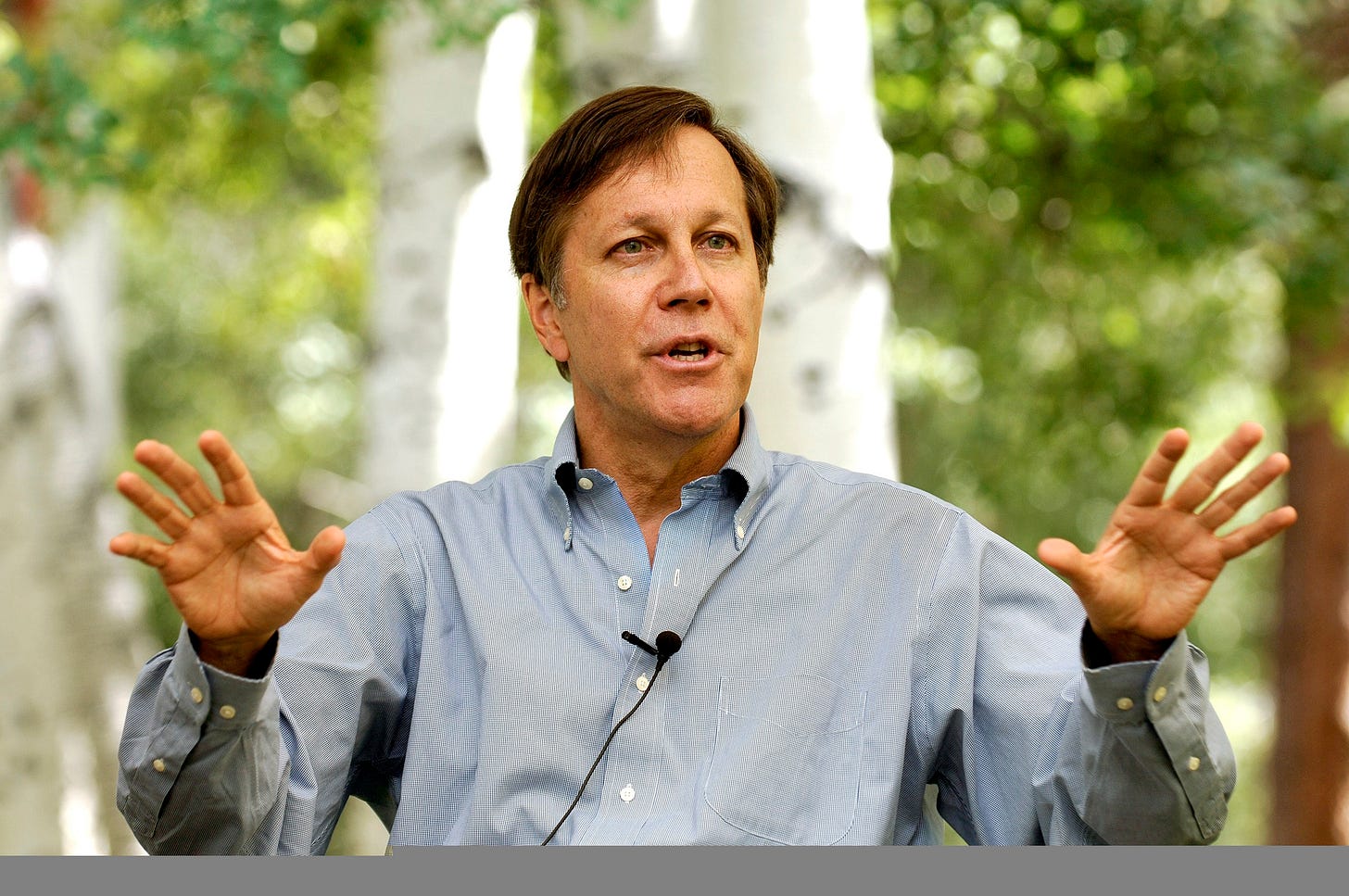Dana Gioia
A talk with a major poet: audio and transcript
Interview with Dana Gioia
Note: I will soon be serializing the novel I mention in the audio Who by Fire.
The first time I encountered poet Dana Gioia was in 1991 when I read his controversial essay in The Atlantic Monthly, “Can Poetry Matter?” and then the book with that title that followed. Gioia has deeply influenced my own thinking about poetry, about literature and about work.1
Note: in the audio, Gioia beautfully recites one of his poems.
In “Business and Poetry,” one of the essays in the book Can Poetry Matter, he plays out the role of those venues with a focus on Wallace Stevens and T.S. Eliot.
The essay written so long ago stands today. Gioia is, himself, no ivory tower figure. He has an MBA from Stanford University, worked more than a decade for General Foods and perhaps re-invented Jell-O before he resigned to write. He knows government too: Six years as Chairman of the National Endowment for the Arts where he was the force behind the Big Read, among other innovations that invigorated the arts in America.
His curriculum vitae—and, yes, Gioia has a poem by that name in Interrogations at Noon that won the 2002 American Book Award—is so long it would replace this interview in length. His newest book, Pity the Beautiful, was long awaited by me while he was busy as Chairman of the NEA.
When I interviewed Gioia, he’d recently become the Judge Widney Professor of Poetry and Public Culture at the University of Southern California. He served as the California State Poet Laureate from 2015 to 2019. During his tenure he became the first laureate to visit all 58 counties of California. His statewide tour became the subject of a BBC Radio documentary. In 2019, he was inducted into the Hawthorne Hall of Fame.
This interview is an excerpt from a blogtalk radio interview with Gioia, who, in my mind, was outside my galaxy. He agreed, swiftly and graciously. The first thing I did was ask him about the new job at the time, in of all places, academia.
Gioia: For decades I’ve done my best to avoid academic employment. My dream is to avoid all employment but my parents neglected to give me the private income I so richly deserve. The University of Southern California created a chair for me half time. I don’t belong to any department and can work across all the arts programs. I’m doing classes on arts entrepreneurship and I’m teaching a gigantic lecture class on modern poetry with 126 kids. Today we’re reading E.E. Cummings. We just finished T.S. Eliot.
Tabor: At this point in your career that has been so sterling, you have 11 honorary degrees—
Gioia: None of which I deserved.
Tabor: Aren’t you modest? On psychologist Maslow’s Pyramid, at the bottom are food and shelter, safety, then love, esteem and at the top is self-actualization. Are you there?
Gioia: I’ve always had kind of an inverted pyramid. My life seems terribly practical from the outside. I’ve had to construct a practical life because everything inside is totally idealistic and self-actualizing. So how could I lead the life I wanted to lead when essentially I’m a working-class kid? I always had a job and I’ve turned down practical offers. I only wrote what I believed I should write. My pyramid is all mixed up. It’s like Maslow’s Rubik Cube.
Tabor: What did your parents do?
Gioia: My Dad was Sicilian and when I was born he was a cab driver, then a chauffeur. My mother worked at the phone company. She was Mexican-American. They were good working people but poor as could be. At the end of their lives, they were totally broke. My brother and I felt we had to be practical with two more kids younger than we were. But at this point I do think I’ve earned the right to just do what I want: to write and to energize culture. American literary culture right now is in the doldrums.
Tabor: You’ve said, “I don’t think Americans are dumber than they were 25 years ago, but our culture is.” Tell me how our culture is dumber.
Gioia: Our culture is vastly dumber. I’ll give you an example. If you’ve got a copy of The New Yorker from 30 years ago, it would have about six times as many words as it does now. The same thing for The Atlantic. With most of our newspapers, if somebody wrote a review of a book, it was thousands of words long. People would actually think through things in print in a serious way. Even if you didn’t like The New Yorker, you had to take it seriously. Nowadays we have the USA Today version of culture. People have been trained by TV and the Internet to want an image and a headline. The notion of careful sequential thought contextualized historically, ideologically is a vanishing skill. When we collectively lose our ability to have sustained linear attention, whole types of thought are impossible. I see this in my students who are bright kids but have read very little.
Tabor: I suspect you’d agree that they watch a lot of movies rather than read books. So, let’s talk film. I’ve been seeing poems appear more and more in pop culture movies. I’ve got high culture and low culture facets and I love romantic comedies. In Four Weddings and a Funeral, at the funeral after the four weddings Matthew played by Scottish actor John Hannah recites Auden’s “Funeral Blues” from “Twelve Songs”: “He was my North, my South, my East and West,/ My working week and my Sunday rest/ My noon, my midnight, my talk, my song.” In the movie that I’m willing to bet you haven’t seen, In Her Shoes, Maggie played by Cameron Diaz recites, as she’s learning to read, Bishop’s “One Art.” Later in the film she recites E.E. Cummings’ poem “i carry you in my heart.” In Must Love Dogs, and another good bet you haven’t seen that one, Bill played by Christopher Plummer recites Yeats’ “Brown Penny.” When I heard these poems, I was moved by the fact that poetry was in these films. What do you think of this?
Gioia: It’s interesting you mention this and that you mention Cummings. About twenty years ago, I saw Hannah and Her Sisters, the Woody Allen film, and at a pivotal point a character recites all of the poem “somewhere I have never traveled, gladly beyond” and the audience was transposed by it. Ever since then I’ve been taking notes on the appearances of poems in movies and in television shows and literally there are hundreds of them. I want to write an essay on this some time soon. I understand poetry in pop culture films being two things: First, unlike journalists, unlike broadcasters, unlike perhaps professors of English, screen writers understand the power of poetry and of great language situated where people can simply experience it as emotional, imagistic communication. They have a faith in it. Secondly, I think they are signaling, ‘Even though I may be writing an episode of Battle Star Galactic or Supernatural, I’m a literate person, have a literate sensibility.’ You cannot watch TV nowadays for seven or eight hours without seeing, sometimes surreptitiously, a poem quoted or sometimes recited in total. I think it’s because directors and screenwriters understand the power of poetry.
Tabor: Dana, you’ve written extensively about Elizabeth Bishop whose poem “One Art” I mentioned, a poem that is a villanelle, a poem in form. You studied with her in 1975 at Harvard and you’ve written about her in Can Poetry Matter and in Disappearing Ink. Talk to me about your fascination with Bishop.
Gioia: Elizabeth Bishop is now probably the most highly regarded American poet of the last 50 years. When I studied with her thirty-eight years ago, she was kind of a marginal figure. The Harvard faculty didn’t really take her very seriously. She hadn’t published a book for a number of years. Almost nobody signed up for her classes. I had loved her poetry since high school when I first read it and heard it set to music by contemporary composers. I loved her because she was a non-literary person who was a great writer, very down to earth. When she talked about and taught poetry, she did it most unconventionally. She gave me the radical notion, which I’m trying with great resistance to give to my students, that maybe the best way of understanding a poem is not to do a deep interpretation of it, but to start by understanding what every word in the poem means.
Tabor: I had a professor like that at Oberlin College. His name was Andrew Bongiorno when I was studying John Donne. Bongiorno and Donne formed my love with the Oxford English Dictionary.
Gioia: My students though are shocked when I actually ask them what a word in a poem means.
Tabor: Or what it meant at the time the poem was written.
Gioia: But in modern poetry students don’t have the fog of history.
Tabor: You’ve also argued in favor of form in poetry but been careful to qualify that, to not make “form” reductive. T. S. Eliot in his seminal essay “The Music of Poetry,” says “Only a bad poet could welcome free verse as a liberation from form.” What’s your take on that?
Gioia: I think there are two ways of writing a poem. One is to create a fabric of sound, a tune, a verbal song. The other is to arrange print on a page. A typographic and a musical organization. My own sense, and I know this is heretical to most people, is that the musical organization has always been the central lifeblood of poetry. The visual organization, while genuine, has been a secondary way of doing it. When poetry loses its ability to enchant and almost hypnotize the reader into an emotional bond with it, it loses the magic that great poetry needs.2
Tabor: Let’s talk about the new collection. In Pity the Beautiful, I sense a certain spirituality throughout. I’d like to turn now to your use of the word pity and refer you to someone you probably know. You’ve created controversy with your essays and so has Cynthia Ozick in hers. She says in her essay “Literature as Idol,” that “an idol crushes pity.” In the title poem I see the idol named: “Pity the beautiful,/ the dolls, and the dishes,/ the babes with big daddies/ granting their wishes.” Do you raise pity not so much against the idol but perhaps in compassion for the idol?
Gioia: It’s a poem of compassion rather than jealousy or envy. There are people who are so lovely that life takes care of them, but when they lose their beauty, they don’t toughen up the way us ugly people do—
Tabor: Oh, you’re pretty good looking, sir.
Gioia: I’ve got the looks for radio. It seems to me our life is so materialistic. Everything in this new book is in a sense a subtle, complicated protest against the gross, short-term materialism of contemporary life in the United States. In protesting, I think that we move with compassion, not with anger.
Tabor: In the poem “Haunted,” you say “beauty always bears a heavy price.”
Gioia: It does. In that poem I’m talking of the beauty of great mansions, the great art and décor. There’s a price in labor. There’s a price in terms of the extraction. “Haunted” is short story, a Jamesian ghost story, and then you realize it’s a love story. But by the end you realize it’s neither alone. It’s a story about spiritual fulfillment. The person in the poem has to move through sex, materialism, possession and avarice to understand what he really wants. What he really wants is dispossession of all these things which own him. He wants spiritual freedom. It seems to me that right now American poetry has to do two things: Regain the territory we lost to prose, to movies to pop music, to tell stories, to be enchanting, to be lyrical, to speak to us as complete human beings. The second thing is to begin to answer the spiritual hungers or spiritual numbness that we see everywhere around us.
Tabor: Dana, I think I can be assured in saying, from reading all of your work, that we both admire Richard Wilbur. To close, I’d like to quote from his poem “The Beautiful Changes”—
Gioia: Let me interrupt to simply say, Richard Wilbur is the greatest living American poet.
Tabor: From Richard Wilbur’s “The Beautiful Changes,” Dana Gioia, “Your hands hold roses always in a way that says/ they are not only yours …”
Gioia: Thank you so much.
Here’s a footnote on our discussion:
I suspect Dana has written about film and poetry; for sure, he’s got an essay on “Movie Fat Men” in the anthology O.K. You Mugs but I’d not read that book at the time of the interview. He also corresponded with me after the interview and sent poems and an essay he’d written when he was NEA Chairman—and he gave me his generous permission (no charge) to quote him in context in the memoir I’ve posted on Substack. Gotta love this poet.
And this: When I saw the James Bond film Skyfall that broke records, guess what? Judi Dench as the marvelous "M" quotes Tennyson:
We are not now that strength which in old days
Moved earth and heaven; that which we are, we are;
One equal temper of heroic hearts,
Made weak by time and fate, but strong in will
To strive, to seek, to find, and not to yield. —the closing lines of Tennyson's “Ulysses”
Love,
This interview without the audio appeared earlier on Inner Life.
This portion of our exchange I reference in “Persephone asks” - part of This Writing Life so thought it best to post this interview so you have the “whole story”.











Such a beautiful interview! I really enjoyed this. Thank you, Mary!
"When poetry loses its ability to enchant and almost hypnotize the reader into an emotional bond with it, it loses the magic that great poetry needs." I love that.
Mary, a wonderful interview. I saved it, to go back to, probably many times. I’m fascinated by the change in Elizabeth Bishop’s reputation. I’ve loved her forever, and can’t imagine her teaching to only a handful of students. And now, she’s revered. That’s only a small part of this rich, wide-ranging conversation. Thank you.🙏